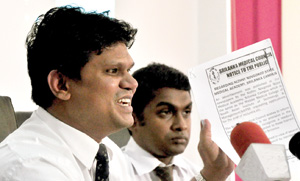The Government Medical Officers Association (GMOA) yesterday protested the victimization of its President Dr. Anuruddha Padeniya for allegedly leading the campaign against the Malabe Private Medical College, and warned it would launch countrywide trade union action from Tuesday unless his personal file was returned to the Lady Ridgeway Hospital (LRH) Director by noon on Monday.
This comes in the wake of a statement from Dr. Padeniya being recorded by the Bribery and Corruption Commission on Tuesday over his two years of leave obtained for his postgraduate training at the Oxford University in Britain.
Dr. Padeniya told Daily Mirror that his personal file with all personal and official documents went missing and he did not know where it was. He expressed surprise and disappointment as to how it ended up at the Bribery commission leading to an inquiry against him.
After a special executive committee meeting last afternoon, the GMOA decided to write to Health Minister Maithripala Sirisena demanding that he conducts an investigation as to how and why Bribery and Corruption Commission got access to his personal file.
The letter states that the GMOA had learnt that Dr. Padeniya’s personal file had been taken out of his present working station at the Lady Ridgeway hospital after citing issues related to his leave.
Leave is an administrative issue and the GMOA General Committee which met yesterday decided to resort to trade union action from Tuesday unless the personal file was sent back to lady Ridgeway Hospital by Monday afternoon.
We request you to grant us an appointment to discuss this critical issue, the letter said.
Dr. Padeniya said the Bribery and Corruption Commission had nothing to do with his leave and if there was any irregularity it was up to the health ministry to conduct an internal inquiry and take appropriate action if he had done anything wrong.
“I was granted leave from 2008 to 2010 by the Health Ministry on the guidelines of the Health Service Minutes for Foreign Training to follow my post graduate degree on Pediatrics. I left Sri Lanka in February 2009 and returned in July 2010 even without remaining in Britain and using my extra months of leave. I was duly trained for a sub-specialist for 18 months as an obligatory requirement and returned after that,’ he added.
Dr. Padeniya said he considered the recording of a statement by the bribery commission as a move to harass him as there was no complainant or a petition against him as far as he knew. (By Sandun A. Jayasekera)
This comes in the wake of a statement from Dr. Padeniya being recorded by the Bribery and Corruption Commission on Tuesday over his two years of leave obtained for his postgraduate training at the Oxford University in Britain.
Dr. Padeniya told Daily Mirror that his personal file with all personal and official documents went missing and he did not know where it was. He expressed surprise and disappointment as to how it ended up at the Bribery commission leading to an inquiry against him.
After a special executive committee meeting last afternoon, the GMOA decided to write to Health Minister Maithripala Sirisena demanding that he conducts an investigation as to how and why Bribery and Corruption Commission got access to his personal file.
The letter states that the GMOA had learnt that Dr. Padeniya’s personal file had been taken out of his present working station at the Lady Ridgeway hospital after citing issues related to his leave.
Leave is an administrative issue and the GMOA General Committee which met yesterday decided to resort to trade union action from Tuesday unless the personal file was sent back to lady Ridgeway Hospital by Monday afternoon.
We request you to grant us an appointment to discuss this critical issue, the letter said.
Dr. Padeniya said the Bribery and Corruption Commission had nothing to do with his leave and if there was any irregularity it was up to the health ministry to conduct an internal inquiry and take appropriate action if he had done anything wrong.
“I was granted leave from 2008 to 2010 by the Health Ministry on the guidelines of the Health Service Minutes for Foreign Training to follow my post graduate degree on Pediatrics. I left Sri Lanka in February 2009 and returned in July 2010 even without remaining in Britain and using my extra months of leave. I was duly trained for a sub-specialist for 18 months as an obligatory requirement and returned after that,’ he added.
Dr. Padeniya said he considered the recording of a statement by the bribery commission as a move to harass him as there was no complainant or a petition against him as far as he knew. (By Sandun A. Jayasekera)


 165 Comments
165 Comments 
 me do that for them; if quality is not up to scratch it can be fixed, hence this is not an argument against private degrees, medical or otherwise, in principle. Enough of all this, let’s get to reality.
me do that for them; if quality is not up to scratch it can be fixed, hence this is not an argument against private degrees, medical or otherwise, in principle. Enough of all this, let’s get to reality.


 Why is the Government not cracking down on an institution which seems to have blatantly misled the public, was the question on the minds of many, with others being very vocal about why strict guidelines, like in India, cannot be brought in for the setting up of private medical colleges.
Why is the Government not cracking down on an institution which seems to have blatantly misled the public, was the question on the minds of many, with others being very vocal about why strict guidelines, like in India, cannot be brought in for the setting up of private medical colleges. 



